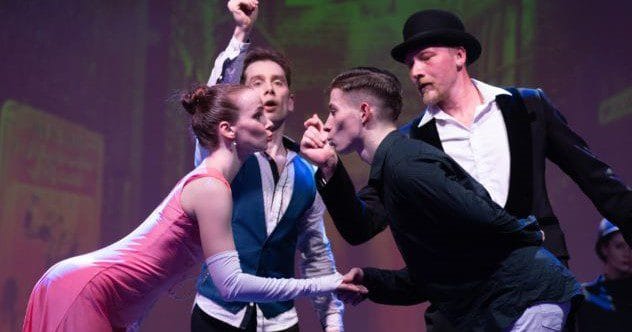Musical theater can be a truly magical experience for a child. Witnessing Elphaba’s ascent in Wicked or the chandelier’s dramatic fall in Phantom can create unforgettable memories. However, not all shows are created equal, and some may not be suitable for young audiences. Sometimes, parents might make hasty decisions, leading to theater visits where children are exposed to content they shouldn’t be seeing.
These shows aren’t necessarily inappropriate for all children, but due to certain elements—a misleading title, a famous song, or a seemingly innocent premise—parents can be misled. This can result in an uncomfortable and awkward experience for everyone involved. Let’s explore ten Broadway musicals that might not be the best choice for your kids.
Cats
Despite being one of the most iconic musicals ever, Cats might not be the ideal introduction to the world of theater for young children.
Cats is infamous for its complex and confusing plot, which many children (and even some adults) struggle to grasp. The basic premise involves a group of cats in London competing to ascend to the Heaviside Layer, their version of heaven.
While the show can be entertaining, its confusing narrative may leave children bewildered. Additionally, many productions employ heavy makeup to transform the actors into cats and often interact with the audience, which can be unsettling for young viewers.[1]
Spring Awakening
The original Broadway production of Spring Awakening featured Jonathon Groff and Lea Michele, both stars of the popular TV show Glee. While Glee isn’t necessarily a children’s show, it gained a significant tween following upon release and continues to be popular.
Attracted by Groff and Michele, these tweens might be drawn to Spring Awakening. However, the musical might not be suitable for them. Based on a play from the 1890s, the show tells the story of a young girl (played by Michele) who is raped by a boy (played by Groff). She becomes pregnant and undergoes a botched abortion, which leads to her death.
Additional storylines include incest, sexual abuse by parents, and suicide. This is a far cry from the lighthearted themes of Glee, where the characters’ primary concern was their glee club’s success.[2]
Hair
Hair stands alongside Cats as one of the most influential and well-known musicals in history. Despite its fame, many people know little about the actual plot. More than just zany singers in wigs, the show is a political statement criticizing war—specifically, the Vietnam War.
The main characters use drugs, engage in sexual activity, and use profanity throughout the show. These elements are essential to the plot, which aims to depict the realities of hippie tribes during the Flower Power era.
Parents should be cautious about bringing their children to Hair primarily due to a scene featuring full nudity. While this might not be an issue for some families, it’s important to be aware of before attending with children (or the in-laws!).[3]
Parade
Don’t let the name mislead you: Parade is far from a lighthearted evening at the theater.
The “parade” in the title isn’t the joyous celebration one might expect. Instead, it refers to the parade planned by the people of Atlanta, Georgia, to celebrate the hanging of Leo Frank, who was accused of raping and murdering a young girl.
Based on historical events, Parade follows Frank as he faces these accusations and the significant injustice that follows. Beyond the tragic story of Mary Phagan, the murdered girl, Parade explores the extreme anti-Semitism that led to Frank’s accusation and the sensationalized, flawed trial.
Overall, this is one of the most intense and heartbreaking shows to grace Broadway, and it can be difficult for adults to fully comprehend. While research would reveal the show’s true nature, those buying tickets based solely on the title may be in for a shock.[4]
West Side Story
It might seem sacrilegious to suggest that the iconic West Side Story isn’t suitable for young audiences, but it’s true.
Many children’s stories are based on Shakespeare, like Gnomeo and Juliet. However, while Gnomeo and Juliet transforms Shakespeare’s tragedy into a garden-themed farce, West Side Story intensifies the violence.
The show features popular songs such as “Maria,” “One Hand, One Heart,” and “I Feel Pretty.” While these songs may sound hopeful, the plot is not. The love story is just one aspect of the show, as the rivalry between the Jets and the Sharks leads to extreme racism and violence, culminating in the protagonist’s violent death. In addition, there are several references to rape, including a scene where Anita is nearly sexually assaulted by the Jets.
It might be better to stick with the gnome version for the first few years.[5]
Fun Home
The title of this musical is misleading. The “fun home” refers to a funeral home, where the main character, Alison, lives with her brothers and parents.
This musical is a biography of writer and artist Alison Bechdel, now a lesbian icon. The story follows Alison as a young girl grappling with her sexuality.
She and her brothers playfully explore the funeral home, introducing the audience to the tools of the trade. Alison experiences some sexual overtones with her first girlfriend, but the show’s adult nature is not just about sex.
Alison’s father is also struggling with his sexuality, which he addresses by engaging in sexual encounters with underage men. Alison desperately tries to get her father to accept both her and himself, but he ultimately chooses suicide over facing the truth.
Not very fun.[6]
Oliver!
Don’t let the exclamation point deceive you: Oliver! is not a cheerful show.
Many assume this adaptation of Dickens’s Oliver Twist is a children’s show, given that it’s named after a young boy and features a predominantly child cast. While children can enjoy Oliver!, people should be aware of the dark content.
The story follows Oliver, who is abandoned at birth and navigates Victorian London. The original book criticized the appalling conditions faced by poor people and orphans, and the musical reflects this. Oliver endures numerous hardships, including being confined in a coffin, sold against his will, and surviving a brutal murder attempt.
Nancy, a prostitute, is one of Oliver’s few friends, but she is brutally murdered by her boyfriend, leaving Oliver alone at the end of the show.[7]
The 25th Annual Putnam County Spelling Bee
There’s a reason why adults play the children in this show.
This musical centers on a group of kids brought together by a spelling bee. Each child loves spelling and has a compelling reason to win.
The show starts innocently, with the kids joking about spelling and getting to know each other, but it soon takes a darker turn. The characters are developed quickly, from a child whose family mocks him for his intelligence to two girls who break down under parental and academic pressure.
When contestant Olive is asked to spell “chimerical,” meaning wildly fanciful, she begins a heartbreaking daydream in which her parents repeatedly say “I love you” and apologize for neglecting her. By the end of the show, her parents’ projections fade away, leaving her alone on stage after one of the most moving songs in musical theater. The audience also learns that Olive may be a victim of child abuse.
But don’t worry, it’s not all sad. Just look at the Act 2 opener: “My Unfortunate Erection.”[8]
Into the Woods
Into the Woods can be suitable for children if you leave after Act I. The official “junior” version of the show only includes the first hour and a half.
As with Stephen Sondheim’s other works, this show involves complicated plots that address subtle issues that children may not appreciate. With central figures such as Little Red Riding Hood, Cinderella, Prince Charming, and Rapunzel, it’s logical that parents would bring their children to see Into the Woods.
Nothing explicitly makes Into the Woods inappropriate for kids. No explicit language or graphic violence. However, unless your children are mature enough to handle Prince Charming’s infidelity and Red Riding Hood’s mother’s death, it’s best to avoid this show.
It’s a fairy tale with a lesson that’s often hard to accept, no matter how old you are.[9]
Avenue Q
Like cartoons, puppetry is often associated with children’s entertainment. However, as TV shows such as South Park have demonstrated, animation can be quite adult.
Avenue Q is to puppets what The Simpsons was to television: proof that any art form can be adapted for adults. Fuzzy characters in advertisements can mislead parents into thinking Avenue Q is a family-friendly show similar to Sesame Street—and, in some ways, it is.
However, Avenue Q doesn’t teach kids to tie their shoes or count to ten; instead, it shows adults what to do with a useless college degree, how to find porn online, and how to deal with a roommate’s sexual orientation. The show is a parody of Sesame Street, but not everyone researches a show before attending. Many parents have unintentionally brought their children, so the official website of the original Broadway production had to add a warning that young children should not attend.[10]
While Broadway musicals offer enchanting experiences, some productions explore mature themes that may not be suitable for children. Before purchasing tickets, research the content and consider the maturity level of your kids to ensure an enjoyable and appropriate theater experience for everyone.
What are your thoughts on this list? Leave your comment below!










